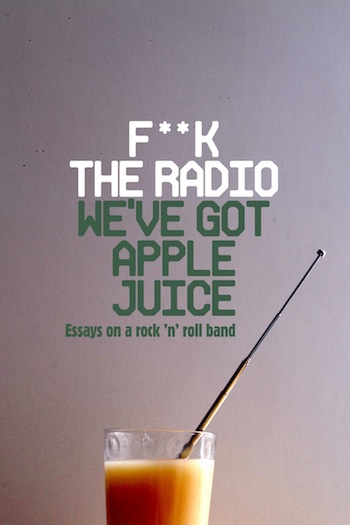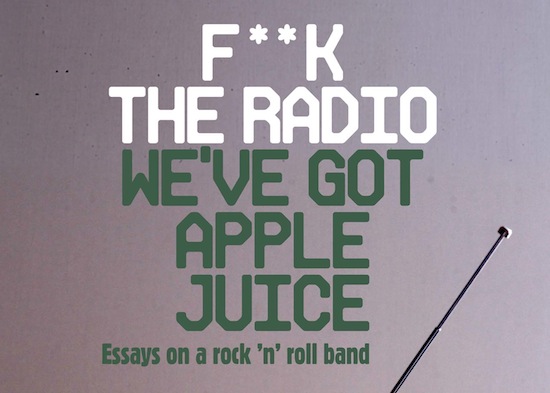At the heart of F**k The Radio, We’ve Got Apple Juice is the story of Oxford-based band Little Fish (whose members have recently reformed as Candy Says – http://candysays.it/). A few years ago, they were living the dream – they’d signed to a major label, recorded an album in LA, and played all over the world, supporting acts like Them Crooked Vultures, Courtney Love, and Blondie. And then, in early 2011, they did the opposite of what the traditional rock ‘n’ roll myth says you should do: they left their label, came home, set up a recording studio in their garage, and started doing it all themselves. The book is about what happened to Little Fish, but it’s also about success, value, relationships, and how to survive as an artist or creator in a world that doesn’t want to pay for anything.
At 14 I fell in love for the first time. He was in a band and we shared a passion for music, or perhaps I should say we shared a prejudice about music: we each considered our tastes to be vastly superior to those of pretty much anyone else, at least in our age group, and we both believed firmly that you could judge a person by what was in her portable CD player. He was the only boy who had ever shown me any positive attention, and we spent three blissful months making out in the library during lunch before, just as school was letting out for the summer, he dumped me. At the time it was unexpected, though in retrospect the line “I’ve told other girls I loved them, but this time I really mean it” delivered two weeks into our relationship as earnestly as a slightly spotty and very scrawny high school freshman in a Blink-182 t-shirt could possibly deliver it, should have been a clue that this was more a spring- time fling than a great love affair.
I duly spent the summer sulking – about the break-up, initially, but then about everything, anything. My best friend and I adopted a uniform that I hoped conveyed our adolescent outrage at the unfairness of love and life; we dyed our hair, painted our fingernails black, ripped our fishnet stockings, wore shirts that were deliberately (and not at all flatteringly) too small, bought plastic studded belts and slung them around our tiny waists like a beauty queen’s sash. I played a song called Why Doesn’t Anybody Like Me? by a band called No Use For a Name on repeat. (When I listen to this song now, for research purposes, I can’t tell if I’m uncomfortable because it reminds me so powerfully of my own teenage awkwardness or because it’s simply very bad music.)
And we went to gigs, dropped off and then picked up a few hours later by our baffled parents. Each time I heard an angry lyric I imagined that it was an expression of my own sentiments; I liked to think that every song had been written for me, to use against whomever or whatever had scorned me. Music, I had discovered, is not just about what you hear; it’s also about what you feel.
At home I listened to women, too, but when we went to live acts it was always to see men, pale-faced sweaty men who jackhammered their way through each song. I suppose I had it in my head that there was something inherently sexual about live music, that it was a situation in which fantasy became acceptable (I thought it was tacky to imagine a film star might sweep me off my feet, but it was not outside the realm of possibility that some bassist or other might catch my eye as I bounced enthusiastically at the front of a small crowd). Some of them were real heart-throbs, or so we thought; we were bored of the clean-faced, drug-addled boys of our private school, their popped collars and Abercrombie & Fitch tracksuit bottoms. We liked the swollen piercings of our pop-punk idols, the greasy hair and thin limbs, the idea that not every male specimen was a pot-smoking lacrosse star with an expensive car and a difficult relationship with his parents. We stood as close to the stage as we dared, while beer-soaked undergraduates from the local university jumped up and down on our Converse-clad feet. I did sometimes sense that there was something desperate about this, that our reaction to these performances we viewed and revered was somehow sterile, predictable, temporary. One of the songs we liked began with a short exchange between a stern sounding couple, who describe their child as being in the punk phase. For a while it had seemed a perfect expression of how little the adults, or even most of our peers, could possibly understand – of course other people thought it was just a phase, but I knew better, this was deeper than that, would last longer, maybe even forever. At the same time, I knew it wasn’t, and wouldn’t, like I knew when my first boyfriend said he loved me that it was a different kind of love, but went on to be disappointed anyway.
As summer ended I found that the thing which had initially given me comfort had become something that felt safe, and one thing I knew was that music should not feel safe. It didn’t always need to rile or challenge – I knew that, I knew it could comfort or soothe – but it should do something, and I had started to feel nothing at all when I heard the man place air quotes around “the punk phase”, followed by the first predict- able rhythms of the song. So I dyed my hair back (our school had a rule about hair, anyway – it had to be a natural colour, and I was pretty sure that Merlot was considered natural amongst vintners but not hairdressers or school authorities). Our school had a rule about shirts, too: they had to be long enough to cover your entire torso. My appearance regressed but I had moved forwards, moved on. I didn’t want a steady beat and a scrawny twenty-something boy whining about the hot girl who had snubbed him. I wanted a different rhythm and a different song.
It’s a complicated business, having a relationship with music, and anybody who listens to music has a relationship with it, if even just for a few minutes. There are so many ways to relate to it: as a fan, as a musician, as an industry professional. And yet the thing itself, the music, remains tantalizingly intangible, a kind of chameleon, taking on the colour of the room you’re in when you hear it or the songwriter’s mood as he crafts the lyrics. “All I’ve got to put in a song is my own experience,” Leonard Cohen tells Dorian Lynskey in an interview for the Guardian. But you could invert the sentiment, too: all I’ve got to get out of a song is my own experience.
I remember my mother driving me to school when I was about ten years old; she had a tape with four different versions of Cohen’s Famous Blue Raincoat on it, which we listened to often. What did I know about the complications of adult love (or even cold winters, for that matter – I’d only ever lived in sunny southern California)? But when I heard the song, sung by Cohen himself in his drowsy way or Joan Baez with her clear rich voice, I had an image in my head, nevertheless, of shadows, an obscured figure in a blue Burberry (a lucky guess), a frosted window. It cooled the hot California afternoons, or gave me hope, in the mornings, that the world was more mysterious than I knew, bigger than this empty stretch of highway and the bullies and bores at school. And while I’ve written about the two-sided mirror, the separation between artist and listener, there is also an undeniable interface; ultimately the relationship – however strong or weak it may be, whatever the impact it may have on writing or listening to music – is at the centre of a song.
“This is a conversation,” writes Andrew Dubber, whose work as an academic, author and consultant revolves around radio and music:
It’s human beings, communicating with each other. That’s it. The whole message in a nutshell: This is a conversation. And by “this”, I mean the whole thing – the music, the medium, the marketing, the technology, the relationship with fans, the branding, the community music workshops, the recordings, the live concerts, the social media profile pages, the improvisations, the downloads, the t-shirts, the BitTorrents, the ringtones, the status updates, the copyright laws, the CDs, the vinyl, the day to day work of being a musician, the inspired musical expression.
Everything, in other words, is about relationships. Nothing is isolated. When we talk about music we don’t talk just about notes on a page, sounds coming through speakers, A&R men “discovering talent”, bands standing on a stage. We talk about how this song relates to us, or how that album relates to a particular period in an artist’s history, or how the band relates to its influences and predecessors. We talk about points of convergence: we talk about where the perception of the artist and the perception of the listener meet. When we say music, or when I say music, at least, this is what I mean: the thing that encapsulates all these relationships and experiences, the thing that needs to be made, heard, and felt in order to really exist.
In a 2004 profile of Björk, Alex Ross describes a conversation with the musician, pointing out that, “Björk often uses the second person to close the distance between herself and others.” At its best, music does this too, organically: sound and memory erase distance, so that when you listen to a song, there’s very little standing between you and the person who wrote it, the person who’s performing it. On the other hand, there’s everything standing between the two of you: the sum of all of the things you know and all of the things she knows, all of the things neither of you can ever know. The overlap and the chasm are the same thing, come from the same place. “It’s human beings, communicating with each other.”

F**k the Radio, We’ve Got Apple Juice is available now, published by Unbound


